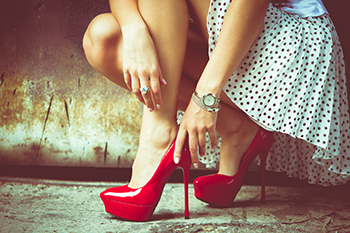
High heels are a popular type of shoe to wear, despite the foot conditions that may develop. Blisters are a common ailment that many women get, and they can occur on the back of the heels, or the sides of the feet. This can happen if the shoe doesn’t fit correctly, and women may use methods such as putting cotton balls in the shoes, or bandages where blisters would develop. Wearing high heels that do not have enough room in the toe area may cause Morton’s neuroma to develop. This is defined as irritation and thickening of the nerve that lies between the third and fourth toes. It can cause severe pain and discomfort, and the pain may be temporarily alleviated when lower-heeled shoes are worn. Additionally, these types of shoes can put stress on the joints and bones, possibly leading to getting a stress fracture. Any type of foot pain that comes from wearing high heels is treated by a podiatrist, and it is suggested that you consult with this type of doctor who can offer relief tactics, and recommend shoes that are better for your feet.
High heels have a history of causing foot and ankle problems. If you have any concerns about your feet or ankles, contact Dr. Kenneth Donovan from Advanced Care Foot and Ankle. Our doctor can provide the care you need to keep you pain-free and on your feet.
Effects of High Heels on the Feet
High heels are popular shoes among women because of their many styles and societal appeal. Despite this, high heels can still cause many health problems if worn too frequently.
Which Parts of My Body Will Be Affected by High Heels?
- Ankle Joints
- Achilles Tendon – May shorten and stiffen with prolonged wear
- Balls of the Feet
- Knees – Heels cause the knees to bend constantly, creating stress on them
- Back – They decrease the spine’s ability to absorb shock, which may lead to back pain. The vertebrae of the lower back may compress.
What Kinds of Foot Problems Can Develop from Wearing High Heels?
- Corns
- Calluses
- Hammertoe
- Bunions
- Morton’s Neuroma
- Plantar Fasciitis
How Can I Still Wear High Heels and Maintain Foot Health?
If you want to wear high heeled shoes, make sure that you are not wearing them every day, as this will help prevent long term physical problems. Try wearing thicker heels as opposed to stilettos to distribute weight more evenly across the feet. Always make sure you are wearing the proper shoes for the right occasion, such as sneakers for exercising. If you walk to work, try carrying your heels with you and changing into them once you arrive at work. Adding inserts to your heels can help cushion your feet and absorb shock. Full foot inserts or metatarsal pads are available.
If you have any questions please feel free to contact one of our offices located in Warren, Livingston, and Toms River, NJ . We offer the newest diagnostic and treatment technologies for all your foot and ankle needs.

